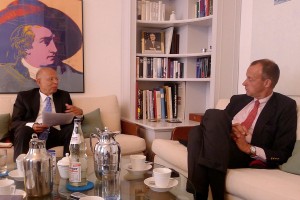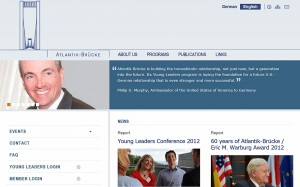Friedrich Merz, Chairman of the “Atlantic Bridge”, on German-American relations then and now. Merz was exclusively interviewed by Rafael Seligmann at the Berlin office.
What is the purpose of the “Atlantic Bridge”?
If you want to understand the “Atlantic Bridge” (AB) today, we must go back in history a little. The AB was founded 60 years ago as an institution for the maintenance of German-American friendship at a time which was still strongly influenced by the consequences of World War II, but also by the beginning of the Cold War.
The AB, therefore, has spent four decades almost exclusively treating foreign and security policy. Its sister organization was and still is the “American Council on Germany”. Both organizations were founded in part by the same personalities. Eric Warburg in particular played a major role.
The range of topics has now broadened considerably. Today, we also talk about economic and financial policy, capital markets, environmental and energy policy. I think we are still the most important German-American institution in Germany. We also witness other big players on the world stage, such as China. The dependence of America and Europe on China brings us, under completely different circumstances, once again together with the Americans.

“We welcome any opportunity to meet and work with Jewish institutions”, says Friedrich Merz, Chairman of Atlantic Bridge
You have been chairman of AB since 2009. What are you planning?
I want to move more into focus again what identified our work from the very beginning: not to be an international, but rather a German-American institution. In many ways, German-American relations have become more complex. The challenges are completely different. We need an especially intensive maintenance of our particularly friendly relations with the United States.
We see ourselves as having a community of values with America. This is more than just economics and defense policy. It has something to do with our values. One can and must have a good relationship with China. We share many economic similarities with China, but we do not share our values with China on democracy, human rights, civil rights. That still makes the foundation of our relation with the United States. In the coming years and decades, this will remain an important cornerstone of how we view ourselves.
You mentioned Eric Warburg. The AB has thus a “Jewish tradition”…
The AB has always had a large number of Jewish members and maintained good contacts with Jewish organizations on the other side of the Atlantic. The AB is not a Jewish organization. We know, however, that Jewish institutions in America have great weight, also in the political parties. In this respect we welcome any opportunity to meet and work with Jewish institutions. But we are an ideologically and religiously neutral institution.
Viewed objectively,Germany and the U.S. as the two piers to a bridge have lost in significance. How can they become stable again?
On both sides of the Atlantic, a lot has changed. In Germany, European policy has come to the fore. We are an integral part of a European community of nations. Actually, we should claim the right to maintain German and European transatlantic similarities, although we know that this, against the backdrop of current issues, particularly the crisis in Europe, is hard to accomplish.
However, what we do here is never directed against Europe, but always focused on the transatlantic dialogue. In America, too, much is changing. America has become more introvert and more self-centered. America has a president who for the first time in American history explicitly describes himself as the first ‘Pacific President’. The U.S. west coast is getting more important for political orientation than the east coast. This means that we must make an effort to be viewed in America as a continent and as a country of political and economic relevance.
We note with some concern the very strong party polarization in the U.S.. We have good contacts with both major political parties. We regret that in recent years, the socio-political debates in the U.S. have become so radicalized. Dialogue is therefore necessary. Perhaps it is even more necessary to also maintain the skills of compromise in foreign and fiscal policy.
Will Europe remain a premier partner of the U.S.?
To date, President Obama has made no state visit to Germany, but has visited other countries: Great Britain, Poland, the Czech Republic. The American image of Europe is sometimes very critical. The European continent is often viewed not on the path to unification, but in dissent, and Americans choose their partners depending on their relevance.
But we are determined to do everything possible to ensure that our relevance will return to its prior rank. Maybe, with the incoming administration, we can contribute to the level of permanent dialogue and encounters so that the contacts with Germans are nursed more intensely by our American friends.
The United States does not hesitate to give Germany advice for our fiscal and economic policy. Aren’t the Americans making a mistake?
Among friends, it must be possible to give advice publicly. The question is if you should not, among friends, proceed beyond what is practiced between friends, i.e. find common political ground lines, for instance in fiscal policy or the regulation of the banking sector. I am personally very sorry that it was not possible to implement what was agreed at the summit immediately after the Lehman bankruptcy. In the question of monetary policy, the Americans have always followed a different model than the Europeans.
Right now, some European governments are approaching the American model in monetary policy. It will not surprise you when I say that I am skeptical whether this is the right way. One of the problems of the United States is their overwhelming debt, made possible not least because of its central bank policy.
Has Germany, in the eyes of Europeans and Americans, become too strong economically?
In the eyes of Americans probably not. The American economy has benefited greatly from German firms, also by jobs having been created in the United States. Our problem is rather an internal European one. In recent years, Germany has gained in the monetary union in absolute and relative strength compared to many other European countries. This has increased the imbalance within Europe.
The federal government has a special relationship with Israel. The Chancellor has told the Israeli Parliament that Israel’s security is not negotiable for Germany. Is there a fundamental solidarity of AB with Israel?
There is a fundamental solidarity which is questioned nowhere within our organization. That’s a given in the Atlantic Bridge, which needs no discussion.
Is, in Europe and especially in Germany, the danger of international terrorism fully realized?
Recently, we have been reminded of the attack in Munich at the 1972 Olympics; many newspapers wrote in detail about the involvement in the German terrorism that began 45 years ago. However, terrorism today shows a very different face, but we also know that this religiously justified terrorism, although it is unjustifiable terrorism, has, with a great deal of luck, passed by Germany so far.
In this respect, German policy would do well to stay with the Americans on the control of international terrorism in the closest possible dialogue and also jointly plan and implement as much as possible. Terrorism fundamentally threatens our liberal societies. What happened in America on September 11th, 2001, was not “just” an attack on the World Trade Center in New York. It was an attack on the liberal societies in Europe and America altogether. We would be well advised to keep this awareness of this massive threat alive also on our side of the Atlantic.


